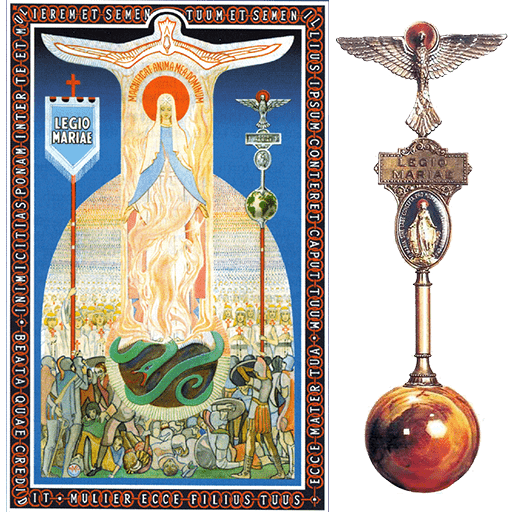Allocutio at December 2013 Concilium Meeting by Fr. Bede McGregor OP
St. John the Baptist and the Legion
********************************
St. John the Baptist is one of the key figures in the Season of Advent. Indeed, he is one of the major figures in the whole history of salvation. He introduces the New Testament to us as specifically he introduces Jesus to us. In fact he has no other purpose except to present Jesus to the world and to each of us. His whole identity is tied up in pointing to Jesus. He prepares the world for Christmas and the unsurpassable mystery of the Incarnation. So there is no surprise that he has such a special place in the Legion and the devotional life of each individual legionary. As the Handbook puts it: ‘he is more intimately bound up with the devotional scheme of the Legion than any of its other patrons, with the exception of St. Joseph.’ Of course, St. John is not just a figure in the past, but is alive in the Church and would be of special assistance to all those who share his mission of preparing the way for Our Lord in coming into the lives of contemporary men and women. The Handbook states categorically: ‘he was the type of all legionaries, that is, a forerunner of the Lord, going before Him to prepare His Way and make straight His path.
At first sight we might find it less than obvious that John is the type of all legionaries. He is sometimes portrayed as being too severe and quick to condemn than being the kind of person that would be an encouraging friend. But the reality is that he gives us the best possible message. He points us to Jesus with the greatest possible clarity and enthusiasm. ‘Behold the Lamb of God; behold Him who takes away the sins of the world.’ We can’t hear a better message than that.
Besides, we are deeply struck by the sheer humility of the man. This is a quality most dear the Legion. He proclaims that he is not worthy even to undo the sandals of Our Lord. And he insists that the Lord must increase and he must decrease. This is surely a basic principle for every form of apostolate and especially the Legion apostolate. We remember how dearly Our Lord loved St. John and so we cannot do less. ‘Truly I say to you, among those born of women there has risen no greater than John the Baptist.’
The Handbook gives us another reason for seeing John the Baptist as the type of all legionaries. ’Moreover, he was formed for his work by Our Blessed Lady herself, as all legionaries are supposed to be.’ We remember the words of Elizabeth to Mary: ‘For behold, when the voice of your greeting came to my ears, the babe in my womb leaped for joy.’ There must be a deep joy too in the legionary who allows himself to be formed by Mary for discipleship and mission. It is worth reflecting deeply on the striking words of the Handbook: ‘That episode of the Visitation exhibits Our Lady in her capacity as Mediatrix for the first time and St. John as the first beneficiary. Thereby was St. John exhibited from the first as a special patron of legionaries and of all legionary contacts, of the work of visitation in all its forms, and indeed of all legionary actions – these being but efforts to co-operate in Mary’s mediatorial office.’ We are called too, like St. John the Baptist to respond to the voice of Mary always and everywhere.
The Handbook gives us one more compelling reason why the Legion has a special place for John the Baptist in its scheme of things. ‘He was one of the essential elements in the mission of the Lord. All those elements should find a place in any system which seeks to reproduce that mission.’ The Handbook then goes on quote Cardinal Danielou: ‘If Jesus is perpetually, ‘He who comes,’ likewise St. John is he who ever precedes Him, for the economy of the historical Incarnation of Christ is continued in His Mystical Body.’
Finally, there is another close connection between St. John the Baptist and the Legion and although it is not explicitly made in the Handbook, it is all pervasively there. The whole teaching of John can be summed up in his opening words: ‘Repent; the Kingdom of God is close at hand.’ The English word, repent comes from the Latin, repensare, to think again, to change direction, to do an about-turn. The underlying Greek word is metanoia, which means conversion, to make a radical new start. Conversion is the key word in the preaching of John the Baptist. And the New Testament is full of conversion stories. What is common to all these stories is the fact that conversion means meeting Our Lord and making Him the centre of the person’s life. This is the purpose of all forms of evangelization – to facilitate a meeting between Christ and another person. This was the essential mission of John the Baptist and it is also the basic reason for the existence of the Legion. If we were to draw up a list of the top ten key words in the vocabulary of the Legion conversion would be very high. On one of his visits to Rome, Frank Duff was asked what he would say to the worldwide Legion if he had an opportunity. Without any hesitation, he summed up everything he wanted to say in one word: Convert. May the Legion turn once more to John the Baptist and our founder, Frank Duff in preparing a way for the Lord in every part of the world and in the minds and hearts of all our contemporary men and women. Amen.
***************************************
